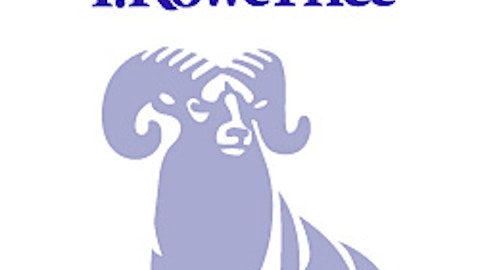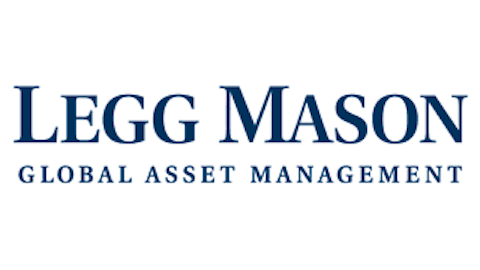
Asset management is a highly-profitable business. The industry generates a profit on other people’s money, taking a percentage of managed funds as an advisory and administrative fee.
In rising markets, asset managers can outperform. Rising asset prices mean higher fee revenue, since fees are assessed as a percentage of assets under management (AUM). Let’s look at three asset managers and assess their future and investment potential.
T. Rowe Price Group, Inc. (NASDAQ:TROW) is one of the biggest “retail” asset managers, catering primarily to individual investors through retirement accounts like 401Ks and variable annuity products.
The company reported a stellar recent quarter, with net revenue increasing to $87 million, an 11.9% improvement over the year ago period. Behind the revenue growth is impressive growth in investment advisory revenue, which was up 12.8% on the back of rising assets under management.
The company manages $284.2 billion in stock and blended mutual funds, and $92.8 billion in bond and money market mutual funds. These funds contributed substantially to revenue to the tune of $490.6 million in the first quarter.
Other managed funds include $175.4 billion of stock and blended funds, and $65 billion in bond and stable value funds.
T. Rowe Price Group, Inc. (NASDAQ:TROW) differentiates itself with a strong brand, retirement plan relationships, and long-term assets. Because it focuses primarily on retirement and annuity fund management, customers have high switching costs that lead to persistent asset growth. Furthermore, its hefty stock allocations provide for underlying growth – when markets rise, so does fee revenue.
Adjusting for cash and investments, the company trades at just 16 times forward earnings estimates. Rising asset values on the back of a bull market could lead to rapid earnings growth. Watch its line of retirement date mutual funds, which are a persistent asset gatherer and fee generator. If Americans step up their 401k contributions, this segment will be the biggest growth driver.
Eaton Vance Corp (NYSE:EV) is a specialty asset manager that focuses on tax strategy to differentiate itself from competitors. Limited competition for tax-focused funds gives this fund an edge in pricing.
As of June 30, Eaton Vance Corp (NYSE:EV) reported $126.2 billion in mutual fund assets, $85.9 billion in separate accounts (plus $18.3 billion for high net worth individuals), and $30.1 billion in retail managed accounts, for a total of $260.6 billion in fee-earning assets under management.
Private funds, closed-end funds, and institutional assets made up 49% of assets under management as of the latest quarterly report. These assets are generally seen as very long-term assets. Closed-end funds, for example, cannot be redeemed directly from Eaton Vance Corp (NYSE:EV), meaning that the company’s earnings do not ebb and flow with inflows and outflows. Likewise, institutional investors rarely make substantial changes to their assets each year, keeping funds with the same manager for decades.
One of Eaton Vance Corp (NYSE:EV)’s specialties, floating-rate funds, offers promise for new asset expansion. Floating-rate funds hold securities that pay varying coupons dependent on interest rates. Investors are snapping up floating-rate funds to prep for rising rates in the future.
At 16 times earnings, investors can get access to a high-quality asset manager with a moat in its niche. Rising rates and sustained equity performance should lead to high single-digit earnings growth. Also, the company offers an “option” in a new ETF and mutual fund hybrid, which Eaton Vance Corp (NYSE:EV) executives believe could lead to substantial forward licensing revenue. That option doesn’t appear to be priced in at the current valuation.
This asset manager is one of my favorites as it deals almost exclusively with money market funds. The company reported in its most recent quarterly report that it managed $284.59 billion in money market funds. Total AUM stands at $381 billion.
Money market funds offer little to asset managers in a low rate environment. Despite the fact that nearly 75% of AUM is attributed to money market funds, only 43% of Federated Investors Inc (NYSE:FII)’ revenue came from its money market products. Fee waivers put downward pressure on fee revenue.
Rising rates offer the potential for higher fees on money market funds. If Federated Investors Inc (NYSE:FII) can add just 5 basis points to its fees on its money market funds, it will send $142 million to operating income, pushing bottom line net income higher by 50% or more.
With or without higher fees on money market accounts, Federated Investors Inc (NYSE:FII) is profitable and trading at 16 times forward earnings expectations, in line with Eaton Vance and T. Rowe Price Group, Inc. (NASDAQ:TROW). However, it offers the largest upside on one-time fee increases plus the highest dividend of the bunch at 3.22%.
The Foolish bottom line
Asset managers can be an excellent investment. Their assets are “sticky” as customers do not move funds frequently, leading to stable income. Additionally, bottom-line income swells with a rise on Wall Street.
Those seeking levered upside with limited downside on the performance of the financial markets might want to take a look at the leading asset managers.
The article 3 Asset Managers Bankrolled by a Bull Market originally appeared on Fool.com and is written by Jordan Wathen.
Jordan Wathen has no position in any stocks mentioned. The Motley Fool recommends Federated Investors. Jordan is a member of The Motley Fool Blog Network — entries represent the personal opinion of the blogger and are not formally edited.
Copyright © 1995 – 2013 The Motley Fool, LLC. All rights reserved. The Motley Fool has a disclosure policy.



